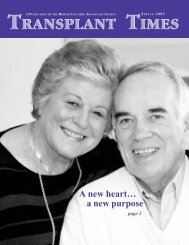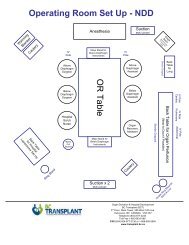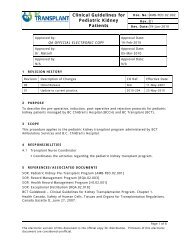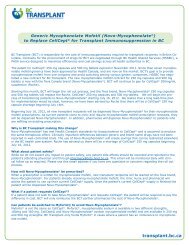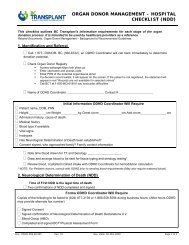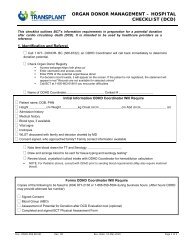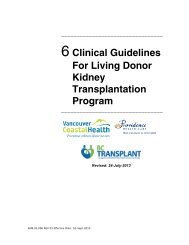4. Clinical Guidelines for Liver Transplantation (PDF) - British ...
4. Clinical Guidelines for Liver Transplantation (PDF) - British ...
4. Clinical Guidelines for Liver Transplantation (PDF) - British ...
You also want an ePaper? Increase the reach of your titles
YUMPU automatically turns print PDFs into web optimized ePapers that Google loves.
Guidebook <strong>for</strong> the Solid Organ Transplant Programme Chapter 4<br />
<strong>4.</strong>1.2 INDICATIONS AND REFERRAL GUIDELINES CONT.<br />
After transplantation, patients will be seen by the transplant team through the Transplant<br />
Outpatient Clinic but are also expected to be followed by the referring physician and the family<br />
practitioner. The role of the transplant team is limited to monitoring graft function, prescribing<br />
immunosuppression and assisting with management of transplant-related complications. The<br />
family physician should be prepared to provide non-transplant care.<br />
Contraindications: The following are generally considered to be contraindications to liver<br />
transplantation:<br />
<br />
<br />
<br />
<br />
<br />
<br />
Active or chronic infection outside the biliary tree<br />
Extensive malignancy<br />
Systemic disease which significantly limits life expectancy or quality<br />
Refusal to accept blood transfusions or blood products<br />
Ongoing or recurrent alcohol or substance abuse<br />
Inability to follow a complex medical regimen<br />
Patients may be referred directly to the <strong>Clinical</strong> <strong>Liver</strong> Coordinator at BC Transplant (604-877-<br />
2240 or 1-800-663-6189).<br />
(See Appendix A: <strong>Liver</strong> Transplant Referral <strong>for</strong>m)<br />
<strong>4.</strong>1.3 ASSESSMENT<br />
Patients are usually seen on an outpatient basis at BC Transplant unless they are too ill and need<br />
to be hospitalized. Critically ill patients may be transferred to Vancouver General Hospital <strong>for</strong><br />
assessment. Following assessment, they are transferred back to their referring physician<br />
whenever possible <strong>for</strong> ongoing management. Patients should be referred when they are still<br />
relatively stable to minimize the likelihood of death or complications that preclude<br />
transplantation be<strong>for</strong>e the evaluation is completed or a suitable donor organ can be obtained.<br />
At the time of the initial assessment, patients will be seen by the <strong>Clinical</strong> Coordinator, a<br />
Transplant Hepatologist and Surgeon. All referred patients will be discussed at a weekly<br />
meeting of the liver transplant team. At that time, a recommendation will be made about the<br />
most appropriate management of the patient’s liver disease. Patients deemed to require<br />
transplantation will then have further investigations, including a CT scan of the abdomen. They<br />
will be seen by an Anaesthetist and by the team’s Psychologist, Social Worker and Dietician. In<br />
some cases, consultation with other specialists may also be sought. During the assessment<br />
phase, the transplant team provides patients and families with in<strong>for</strong>mation about transplantation,<br />
including the risks and benefits of the procedure, medication regimens and the transplant<br />
process.<br />
Chapter 4 – <strong>Clinical</strong> <strong>Guidelines</strong> <strong>for</strong> <strong>Liver</strong> <strong>Transplantation</strong> – July, 2010 Page 4<br />
See Page 1 <strong>for</strong> disclaimer




